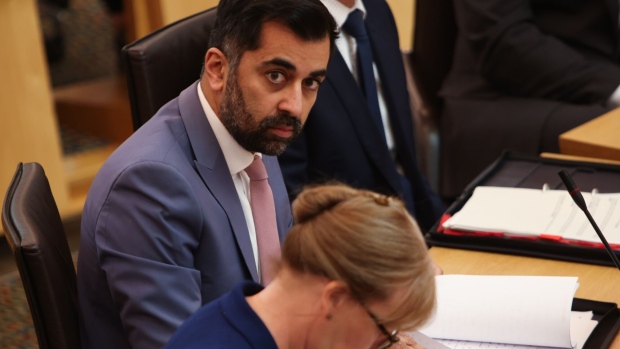Jan 31, 2024
Labour Gets Boost as Scottish Nationalists Face Covid Backlash
, Bloomberg News

(Bloomberg) -- A slew of negative headlines about how Scotland’s ministers behaved in the pandemic threatens to further undermine the Scottish National Party and leader Humza Yousaf, as he tries to hold off a resurgent Labour Party looking to capitalize and ease its path to UK power at an election this year.
Yousaf has endured almost a year of turmoil since taking over the SNP after the resignation of long-time leader Nicola Sturgeon, who gave evidence to the UK’s Covid-19 inquiry on Wednesday. A police inquiry into the party’s finances is ongoing, embroiling Sturgeon and other former senior members of the SNP.
Read more: Labour’s Hopes of Taking UK Power Could Come Down to This City
The latest setback stems from a row over the conduct of the SNP, which has run Scotland’s devolved government since 2011, during the coronavirus outbreak. The probe heard this month that Sturgeon deleted all her WhatsApp messages from the period, and while she later said she submitted copies, it triggered accusations of a cover-up. Scotland’s national clinical director Jason Leitch also said he deleted messages, insisting he was following government guidance.
Sturgeon told the inquiry she did not “make decisions through informal messaging” nor “have substantial or lengthy or detailed discussions about government decisions through these means,” adding: “It’s not my style, it’s not my practice, it’s never been my practice.”
Former UK premier Boris Johnson and current Prime Minister Rishi Sunak have also faced intense criticism for not handing WhatsApp messages to the inquiry.
Even so, the furor around Sturgeon plays into a political narrative with implications beyond Scotland, with Britons expected to cast their ballots in a general election in the second half of 2024. Keir Starmer’s Labour party has a commanding lead in national polls but due to the scale of its defeat last time, it needs to add an historic number of seats to oust Sunak from 10 Downing Street.
That makes the pro-independence SNP’s fortunes so important. If Labour can significantly boost the seats it holds in Scotland — it currently has two compared with the SNP’s 43 — it would have a far better chance of winning an overall majority across the UK and returning to power after 14 years.
Scottish Labour leader Anas Sarwar told reporters in Westminster there was a “huge sense of betrayal” among voters following Sturgeon’s evidence. He said the SNP harbored a “culture of secrecy and cover-up.”
Surging ahead
Current polling looks positive for Labour: a survey by Norstat for the Sunday Times on Jan. 25 — the first since the WhatsApp deletion row — had Labour surging to its biggest lead over the SNP for almost a decade. The research put Labour on 36% compared to 33% for the SNP.
Prominent psephologist John Curtice, a politics professor at Strathclyde University in Glasgow, told the newspaper that would give Labour 28 MPs and the SNP 18.
It would be a far cry from recent elections. Labour’s nadir came in 2015, when it lost 40 of the 41 Scottish districts it held in the UK Parliament. The SNP won 56. At the last general election four years ago, the SNP won 48 of Scotland’s 59 seats, with Labour again wining just one.
As recently as the summer of 2020, support for the SNP regularly ran at over 50% in surveys of voting intention, with Labour under 20%.
According to Curtice, it was events in London not Scotland that changed the picture. Ex-premier Boris Johnson became embroiled in a “Partygate” scandal about rule-breaking parties in the pandemic that contributed to his ouster in July 2022, and then his successor, Liz Truss, roiled financial markets with unfunded tax cuts that sent mortgage costs soaring for millions of Britons.
“They boosted Labour north of the border,” Curtice told Bloomberg. “Most of the ground Labour gained, they gained before the SNP hit trouble.”
That political dynamic — Scottish voters prioritizing the removal of the Conservatives — explains Yousaf’s recent comment to the BBC that Starmer will “undoubtedly be the next prime minister.” The message he wants to convey is that SNP supporters don’t need to defect to Labour to get rid of the Tories.
But the argument is undermined by the SNP’s own struggles. By far the biggest issue is the hangover from Sturgeon. She was a totemic figure in British politics, making it difficult for any successor.
The challenge facing Yousaf, who was justice minister and then health minister under Sturgeon, has been exacerbated by the police inquiry. She was arrested in June as part of that investigation and later released without charge. Scotland’s police has declined to comment on its plans for the case as the probe continues, and Sturgeon has said she is innocent.
That makes it hard for the SNP to draw a line under the issue. In October, Labour ousted the nationalists in a special election in Rutherglen and Hamilton West, on the edge of Glasgow, in a victory dubbed “seismic” by Starmer.
--With assistance from Alastair Reed.
(Updates with comments from Sturgeon in fourth paragraph, Sarwar in eighth.)
©2024 Bloomberg L.P.







